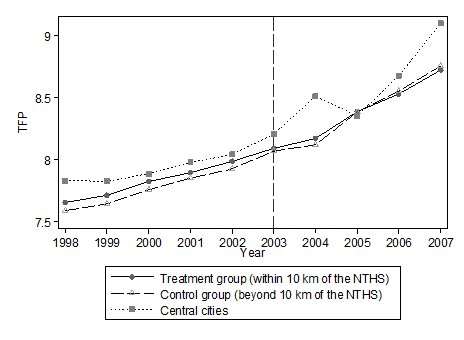Highway links benefit businesses, unless they are based outside cities

There is a Chinese proverb: "If you want to be rich, build roads first; if roads are open, all businesses will flourish." Many studies have shown that the construction of transportation infrastructure has played an important role in China's social and economic development. However, few studies have focused on how construction impacts enterprise efficiency and macroeconomic growth on a regional basis.
A new study, published in the KeAi journal China Economic Quarterly International, has drawn on data related to China's national trunk highway system (NTHS) to explore this issue. Researchers found that the construction of the five vertical and seven horizontal national trunk highways between 1998 and 2007, has not benefitted all regions along the NTHS, or the enterprises operating within them.
Study author, Ming Xu, of China's Guangdong University of Foreign Studies, explains: "Transportation infrastructures create economic connections between regional central cities across the country, and connect small and medium-sized cities along the route. In theory, this reduction in time and space distance promotes transportation accessibility, reduces transportation costs, and improves transaction efficiency and economic growth. But we found that while connecting county-level enterprises along the system with big cities does improve their ability to specialize and their division of labor, the county-level enterprises remain at the low end of the regional industrial value chain. Therefore, it is difficult for them to share the same efficiency improvements that enterprises in big cities enjoy."
Xu adds: "In fact, due to the high volume of traffic on the roads, high-quality production resources tend to cluster in the big cities. The flow of labor and intermediate goods and services, in other words the inputs into the provision of final goods and services, are particularly sensitive to these transportation conditions. This makes light industry and labor-intensive enterprises more vulnerable to the big city cluster effect."
According to Xu and co-author Yuan Feng, these results provide a new perspective on the economic distributional effect of large-scale transportation infrastructure, and have implications for future policy making.
Xu explains: "We should be aware that the improvement of transportation conditions leads to the redistribution of economic resources, namely, the economic distributional effect. Local governments and policymakers should pay high attention to this."
More information: Ming Xu et al, How transportation infrastructure affects firm Productivity? Evidence from China, China Economic Quarterly International (2022). DOI: 10.1016/j.ceqi.2022.02.001
Provided by KeAi Communications



















